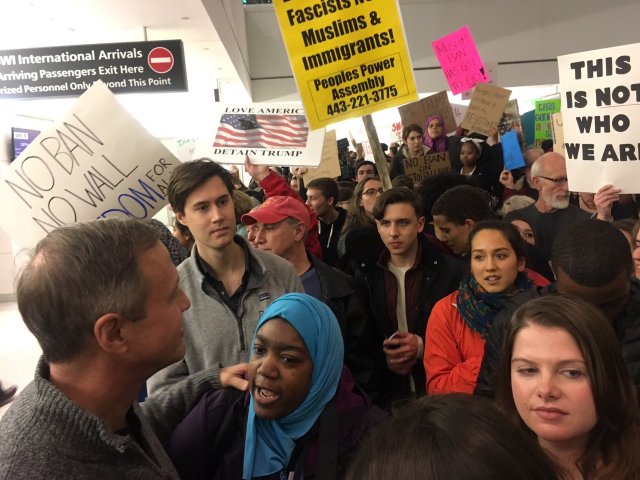
Donald Trump came roaring out of the starting gate after his inauguration, doubling down on the main themes of his election campaign. He moved quickly to initiate a slew of executive orders, tweets and rulings.
One major aspect of this is his drive to progressively concentrate ever more power in his own hands. Since the start of his campaign for president, Trump has maintained that the establishments of both the Democratic and Republican parties have failed to deal with the problems facing US people at home, and the decline in US power globally.
Trump’s consistent claim is that a strong man is needed to set things right — and he happens to be just that strong man. No one else can do it, Trump insists, as all the others are weak “losers”.
Part of Trump’s pushing of this narrative is to attack and belittle anyone who criticises him in any way, even on small matters. An example was his denunciation of sections of the capitalist media who had the temerity to assert that the crowd at his inauguration numbered less than the one for Obama in 2009. When challenged, he stuck to his claim, even in the face of photographic proof to the contrary.
When publicly challenged on the question, his high-ranking assistant Kellyanne Conway famously said that Trump has “alternative facts”. One aspect of his self-aggrandisement involves presenting his own version of reality — and riding roughshod over all who question it.
A big example of his drive to concentrate more power is his ban on Muslims from entering the US, and the ongoing court battle over it.
He issued his fiat stopping anyone from seven majority Muslim countries — Iraq, Syria, Iran, Sudan, Libya, Somalia and Yemen -— from entering the US. He did so without consulting with his own State Department and other agencies.
The plan was hatched in secret by a small group of his closest advisors, including his chief strategist, the sinister white nationalist Steve Bannon. US embassies, immigration officials, corporate airlines and others were suddenly instructed, without warning, to implement the ban, which caused turmoil and hardship for tens of thousands.
When a federal judge overturned the ban, Trump denounced the “so-called judge”.
During his campaign, Trump promised to ban all Muslims from entering the US. What happened next was explained on Fox News by former New York City mayor and Trump toady Rudy Giuliani, who said: “So when he first announced it, he said ‘Muslim ban.’ He called me up. He said ‘Put a commission together. Show me the right way to do it legally.’”
They came up with the idea of the ban on people from certain countries, instead of all Muslims, which Trump put into effect. This was done to avoid legal issues from blatant religious discrimination. But everyone knows the ban is directed at Muslims.
Many in the capitalist press have said the ban was done poorly. Trump should have gone through the “proper channels and procedures”.
But from Trump’s and Bannon’s point of view it was not done poorly at all. Trump deliberately did not consult widely or go through the “proper procedures” because he was testing the waters. He was seeking to test his powers, to see what he could get away with, without seeking approval from others. His move also went a long way to fulfilling a campaign promise to seek a ban on entry by Muslims.
Trump has tamed the Republican Party, which now controls both houses of Congress. With the executive and legislative branches under his control, that leaves the judiciary. This is why Trump is going after judges who rule against him.
The administration appealed the ruling to a federal district court. The government’s lawyer referred to a law that authorises the president “to suspend entry of classes of aliens when it is necessary or when otherwise it would be detrimental to the interests of the United States”.
This law is evidence of the extra powers granted to presidents both Democrats and Republicans since World War II. Trump is seeking to push these powers further.
The legal counter-argument is based on the true point that the ban is based on religion. Trump made this clearer by tweeting that Christians from the seven countries included in his ban countries could be allowed to enter the US.
August Flentje, the administration’s lawyer, said: “The reason we sought immediate relief and a stay is because the court’s decision overrides the President’s national security judgment about the level of risk…
“[I]t should be acknowledged that the President is the official that is charged with making those judgments.”
One of the appeal court’s judges then asked: “I mean, are you saying that the President’s decision in that regard is unreviewable?”
Flentje answered: “Uh, yes.”
Another judge asked: “Could the President simply say in the order, ‘We’re not going to let any Muslims in?’”
After trying to avoid answering, Flentje finally said that there would be a “route to make a constitutional challenge if there were such an order. It would be by a US citizen with a connection to someone seeking entry.”
The next day, Trump denounced the appeals court judges as “disgraceful”.
It is clear that Trump wants to limit any judicial review of his rulings. It is probable that he would fight any court reviews of laws passed by his congress.
The case over the ban will eventually go to the Supreme Court, which, once the Senate has confirmed Trump’s nominee, will have a clear right-wing majority.
Trump’s power-grabbing direction is clear, and we aren’t even past the first month of his administration.